Minari depicts the love and survival of a family in a new land | Film Review by Song Un Lee (Winter 2021 issue)
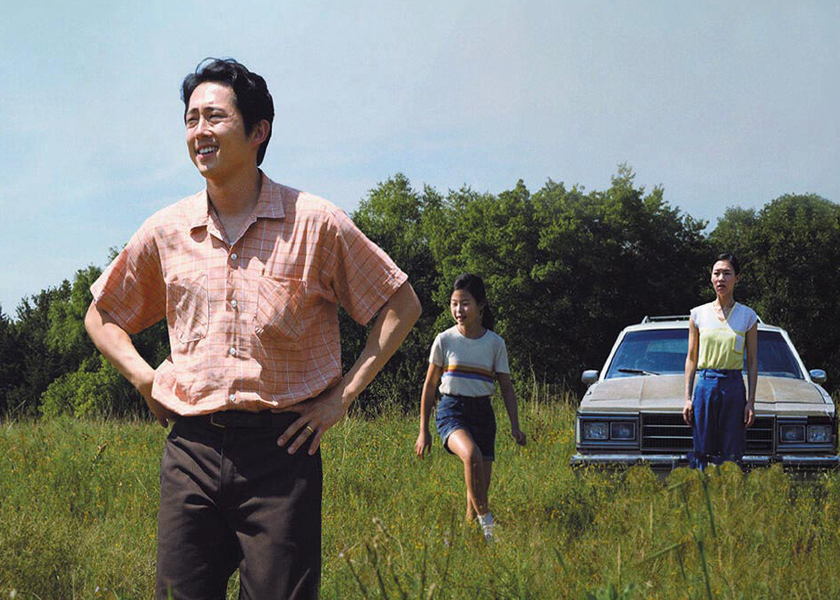
Minari Directed by Lee Isaac Chung (2020)
When I was living in a suburb of Minneapolis with my parents, our backyard consisted mostly of a wooded area that sloped down from the house and leveled out near a neighborhood walking path below. It was on this low area that my mom grew minari plants, since water would flow down and settle there as well. Minari is a perennial wild plant that grows well where there is good soil and easy source of water.
Don’t ask where she got the seeds, but my mother’s minari flourished quickly and abundantly. Fresh minari produces a unique edible green. It is hard to come by in Asian grocery stores because the leaves wilt relatively quickly after they are picked. In the Lee household, we ate minari with almost every meal. There were always eager recipients of this green treasure in the Twin Cities’ Korean American community. It was also not uncommon for random Korean women to knock on our door asking permission to help themselves to the plants in the back. We would always oblige. If we weren’t home during the unannounced visits, I’m sure they would pick them anyways.
Unsurprisingly, minari is more popular among the older generation. Koreans and Korean Americans my age were not interested. People of our parent’s generation were more appreciative of the health benefits and the scarcity of this commodity in Minnesota.
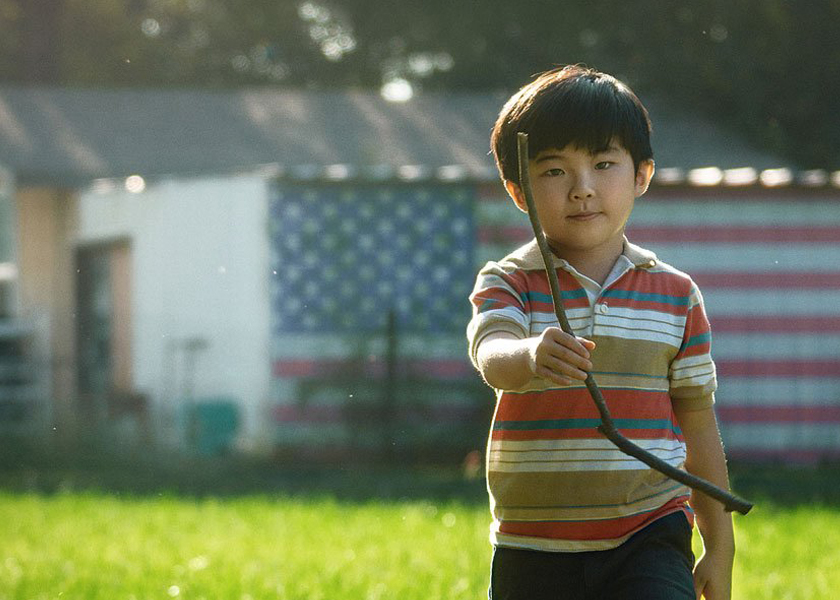
So, when I saw the trailer for the new film, Minari, it felt personal already. The film trailer showed an image of a mobile home and it instantly reminded me of old pictures of my cousins posing in front of their mobile home, wearing shorts and tube socks, during their early immigrant years in Minnesota. The preview also showed a clip of the Korean family worshipping in a church chapel, which brought vivid memories of growing up in the Korean church. The church was the nexus of the Korean American community when I was growing up in the ‘80s.
I needed to seek out this film. Seeing the film trailer made me reflect that I didn’t remember any other film that provided such authentic glimpses of the Korean American family experience.
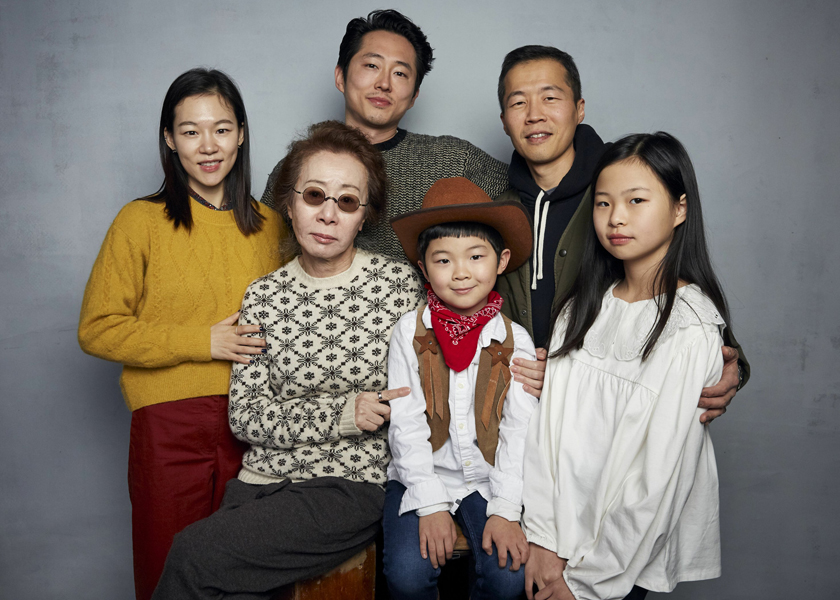
Minari, written and directed by Lee Isaac Chung, made a big splash at the Sundance Film Festival almost a year ago (February 2020) when it won the grand jury prize for a U.S. drama and the audience award for a U.S. drama. Yet, due to COVID-19 restrictions and other circumstances, the film has been difficult to find. Distributors are planning a limited release of the film to theaters starting February 12, followed by a wider release March 15. There will also be a premier video on demand release on February 26.
The film tells the story of the Yi family, made up of father Jacob (Steven Yeun), mother Monica (Yeri Han), older daughter Anne (Noel Cho), and younger brother David (Alan S. Kim). Later they are joined by Monica’s mother from Korea, Soonja (Yuh-jung Youn).
The story is set in the ‘80s. The setting is rural Arkansas in the Ozarks region. Tulsa, Oklahoma is the nearest city. It is certainly off the beaten path, compared to areas where Korean American families typically settle, such as Los Angeles or New York City. Prior to the move, the Yi family lived in Los Angeles, then Seattle.
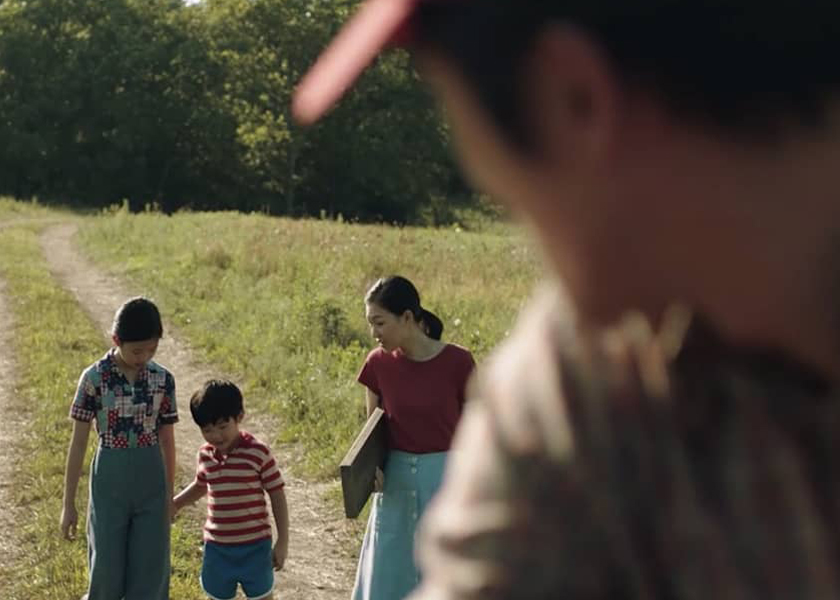
At the beginning of the story, they are about to re-start their immigrant journey. The film does not reveal the back story of why this family fled the cities, but it’s not uncommon for immigrant families to go through multiple setbacks until they establish some semblance of security, if not financial success.
In this new and seemingly fertile land, Jacob dreams of producing large crops of Korean vegetables for the growing market of Korean Americans across the U.S. Yet in the meantime, to make ends meet, Jacob and Monica both work full time at a baby chick sexing factory where they separate the chicks by gender for eight hours a day.
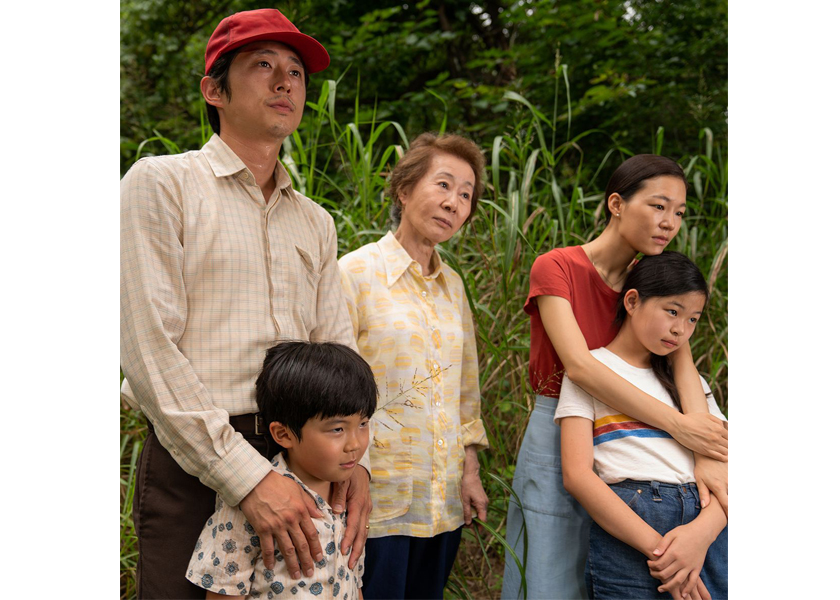
Minari is a beautiful film, full of nuanced emotions and truthful expressions of the human condition. Of course, as a Korean American myself, I felt an especially strong connection to the film and its characters. There are moments of the movie that are evocative for immigrants, such as the shouting matches between the parents due to their financial stress, and their second-guessing of their risky decision to leave the motherland; and one where two cash-strapped family members fight over a cash-filled envelope – one side insisting on giving the cash, and the other side adamantly shoving it away.
There are moments I recall from my childhood: Receiving suckers from the teller when we kids accompanied our dad to the bank; and opening up a can of Chef Boyardee for lunch while our parents are away at work. There are others evocative particularly of a Korean American upbringing: The joyful unwrapping of fine chili powder and dry anchovies that relatives would bring back from Korea. Actress Sandra Oh, while moderating the post-screening discussion with the cast and director Chung, confessed she burst into tears when she saw Monica casually dip her finger in the chili powder bag and taste the authentic Korean flavor.
There is also a very Korean scene of the mom cleaning earwax from her kids ears; I remember submitting to that treatment with my head comfortably on my mom’s lap. These and many other moments are portrayed with ease and a matter-of-fact style, which stir the heart effortlessly.
Overall, the emotional weight of the film is carried by the contradicting themes of optimism and desperation, as we follow the story of the Yi family, not knowing if their pursuit of the American dream will end in success, or if their endless striving will be the end of the road for them. There is a universality of the immigrant story, and a familiar memory for many Korean Americans, in how the parents recognize the uncertainty of their future, and deal with it by overworking and praying tearfully every day for God’s blessings.
Regarding spirituality and the church, specifically the Korean American church, Minari alludes to the Korean church experience from a distance, since there are no Korean churches where the family lives. Chung’s depiction of Christianity and the church is nuanced and respectful. Few films address the presence of church life or the spiritual life of their characters, and if it is depicted, it is only in passing or with smug satire or ridicule.
Yet for Korean Americans, church is the heart of community, especially during the ‘70s and ‘80s. Monica’s Christian faith is more apparent, while Jacob is more skeptical. There’s a scene in the factory where Monica asks her workmate, who is also Korean, why they don’t have a Korean church in their community. The woman replies the reason they live in rural Arkansas is, in part, to escape the Korean church community.
At the wife’s urging, Jacob eventually agrees to take the family to the local church on a Sunday, where they are greeted with warm hospitality. A lesser film would have shown scenes of fear and suspicion among the white congregants but Chung’s depiction is less predictable. Instead of suspicion, the newcomer family is treated like shiny new toys to be admired and objectified.
They comment on the physical appearance of the Koreans. There are comments on Monica’s delicate features. A boy comments on David’s flat face. It also suggests a burgeoning stage of the model minority myth formation in the U.S. After this Sunday visit, Anne and David start to participate in weekly fellowship activities with the church kids. The church van comes to pick them up at their trailer.
The film also describes the character of Paul (Will Patton). Jacob hires him as a farmhand. Likely a veteran of the Korean War, Paul seems to suffer from mental issues, but is a devout Christian, seemingly of the Pentecostal faith. He does church his own way; by literally carrying a life-sized wooden cross along a dirt road every Sunday. Church as community is prioritized. Church as manifestation of faith is shunned if the practice doesn’t conform to the norms of the community.
By situating the family in rural Arkansas, the film strips away the external factors governing more typical immigrant stories, such as the influence of the greater immigrant community, the overt racism of the white neighbors, or the crime and violence of the urban setting. In fact, director Chung actually grew up in Arkansas with his family, not far from the Ozarks where the film is set, so the film is partially autobiographical. But unlike most dramas, the conflicts do not rise from contrived, external villains (such as a racist neighbor or banker), but rather emerge from inherent difficulties of starting a life in a foreign land. These include dealing with competing goals within the family, and random elements always looming on the horizon, like tornadoes and thunderstorms, or lack of water for the crops.
If there are any villains in the film, they are other Korean Americans that might have driven the family into this rural land, as well as untrustworthy Korean buyers for Jacob’s crops.
As a Korean American who faced racism, I am fine with the lack of overt racism depicted in the film. Firstly, the story is unique to the Yi family. Additionally, the director would be taking on a hefty load if he chose to wade into the complex pool of racism, and the family’s response to it from the mindset of the 1980s. The director would also have had the tricky job of navigating how 2021 viewers would understand this dynamic. Indeed, the stakes are high enough for this family without introducing outside societal barriers such as racist townsfolk somehow shoehorned into the plot.
Instead of checking the racism box, Chung keeps the narrative stripped down, focusing mainly on the drama, and humor within the family. There are indelible images from the film, especially close-ups of Jacob and Monica as they are trying to hold it together for themselves and the family. The subtle expressions of love and regret on their faces tell lifetime worth of stories. At the same time, Chung is gifted in complexities, and perhaps this talented director will depict the social and emotional landscape of immigrants and racism in a future project. And if not Chung, others could follow in this landmark film’s footsteps to tell their own personal stories of Korean-American experiences.
In an interview, Chung mentioned he was also inspired by novelist Willa Cather’s My Antonia. This book captured my imagination when I was in college as well. It is, in part, an immigrant story, set in the era of the pioneering homesteaders of the 1880s. Minari can also be seen as a man versus the earth, pioneer story set a century after My Antonia. There is nobility in Jacob’s courage to lead his family to farm on the soil of this foreign land. Yet there is a fine line between the sense of grand possibility and fear of failure. In one devastating line, Jacob tells Monica that if he fails again, she can take the kids and leave him. In Minari, the influence of the primal battle of My Antonia adds that extra layer of pioneering spirit/fear.
Another virtue of the film is that it is not a memoir seen through the eyes of one of the kids. The family unit as a whole is the protagonist of the film. All the characters are memorable and fully realized. The older sister Anne has to be more mature than her age and responsible for her younger brother David while her parents are away at the factory.
David, the more happy-go-lucky younger sibling, must believe that everything will turn out okay at the end and behaves accordingly. He is the most optimistic one of the family, yet ironically, he is also the one with a life-threatening heart problem that precludes him from running in the wide-open field. He is also that cute, funny kid that provides the comic relief, and Alan S. Kim definitely delivers.
David may be the adorable, funny one but he also expresses the transferred psyche of the parents’ desperation and anxiety through nightmares and mischievous behaviors. When Monica’s mother from Korea arrives, her presence brings additional humor and life to the family unit. She is also the only one encouraging David to run around the field without fear of his heart condition. Grandma’s carefree spirit is just what David needs and they gradually become kindred spirits.
Monica, the mother is stoic and makes a valiant attempt at supporting her husband since she understands the precariousness of their situation. She cares for the children and her mother while Jacob is outside working the field. Yeri Han plays Monica with a subdued tone, always holding back a deep well of emotion just beneath the surface ready to burst at any moment. Jacob, the father, must put on a brave face.
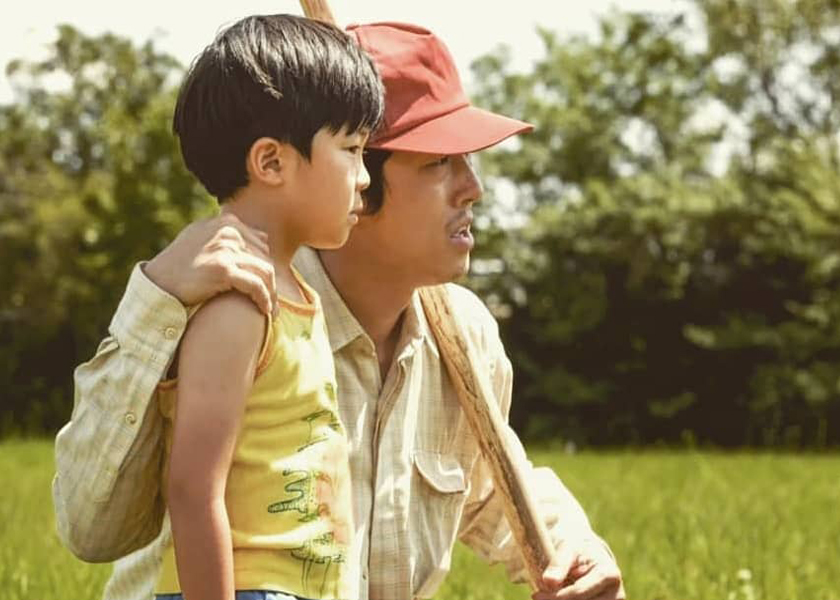
Steven Yeun seems to be cast against type and works very well in this context. His features are not the typical rough and weathered farmer. He has a youthful, soft disposition that belies the tough, brusque front he puts on as the head of the household. Minari doesn’t show any scenes of explicit intimacy between the still-youthful Jacob and Monica, but Yeun and Han as a couple are utterly convincing. There is a tender scene in the bathroom where Monica washes Jacob’s hair for him, and the image and the sound of the water pouring over Jacob as if being baptized by Monica shows them trying to connect emotionally even while they are reticent to communicate verbally for fear of sparking conflict.
The titular minari green appears in the film when the grandmother plants the minari seeds she brought from Korea near a nearby stream and a wooded walking trail. The connection between Korea, the motherland, the grandmother, and the minari seed is clear. Minari will flourish once it is planted in good soil with adequate water. Taking root on this land for the Yi family requires resiliency that goes beyond growing good crops, where strengthening the family structure takes precedence.
In the upcoming months, the film Minari will start to increase in buzz and the Oscar marketing campaign will hit its stride. The media and perhaps even the filmmakers and the cast will emphasize the universality of the theme and the narrative and downplay the Korean American heart at the core of this film. That’s all well and good. Yet, first and foremost, Chung, Yeun, and rest of the cast have made an achingly personal Korean American film that seems to channel the family bond and the struggles that Korean immigrants have lived through.
Minari is a landmark film as the first high-profile, authentic depiction of the Korean American immigrant experience. It honors the struggles of the families with humor, compassion and authenticity. As the credits roll and Emile Mosseri’s haunting Rain Song sung by Yeri Han (Monica), plays in the background, I shed cathartic tears.
For the children of immigrant Koreans, Minari evokes emotions because it honors the courage and sacrifice of our parents, who exposed themselves to fear and anxiety in leaping into the unknown. Yet, the tears are also for the children of the parents, the Korean American second generation. We found resilience and strength in overcoming racism, we endured the hardships and trauma of culture shock, and we attempted to straddle two cultures with dual identities, navigating the gap while retaining our dignity and humanity.
Minari inspires me to give a shout-out to the 1.5, second-generation Korean Americans and Korean adoptees out there. For those out there fighting the good fight, much respect for the resiliency and overcoming all the barriers. Keep plowing the field, and continue producing the good crops. Find your worth in this country where our parents planted the seeds for our lives to be firmly rooted.


